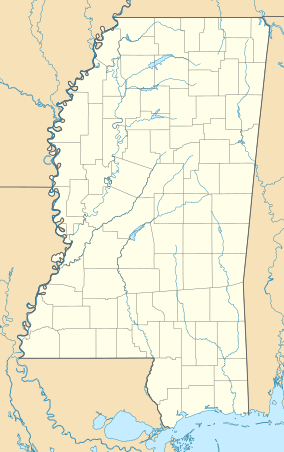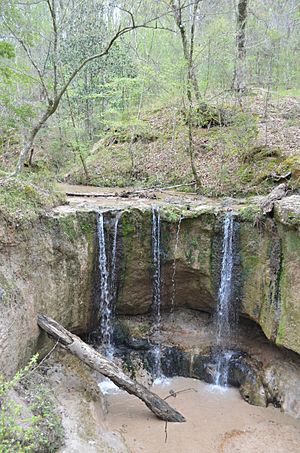Clark Creek Natural Area facts for kids
Quick facts for kids Clark Creek Natural Area |
|
|---|---|
| Location | Wilkinson, Mississippi, United States |
| Area | 700 acres (280 ha) |
| Elevation | 200–400 ft (61–122 m) |
| Established | 1978 |
| Governing body | Mississippi Department of Wildlife, Fisheries and Parks |
| Website | Clark Creek Natural Area |
Clark Creek Natural Area is an amazing place in Mississippi where nature is protected. It covers about 700 acres (280 ha) and is located near Woodville. This special state park is famous for its many waterfalls, with about 50 of them! Some waterfalls are really tall, dropping up to 30-foot (9.1 m). People love to visit Clark Creek for hiking, watching birds, and even geocaching.
Contents
What is the History of Clark Creek Natural Area?
Clark Creek Natural Area became a park in 1978. Many groups worked together to make it happen. These included the Mississippi Wildlife Heritage Committee and the Nature Conservancy. Wilkinson County, International Paper Company, and the Mississippi Department of Wildlife, Fisheries and Parks also helped. Their efforts made sure this beautiful area would be protected for everyone to enjoy.
What Plants and Animals Live at Clark Creek?
Clark Creek Natural Area is home to many different kinds of plants and animals. It has a mix of hardwood trees and pine trees. You can see large beech and magnolia trees growing here.
Unique Trees and Plants
This park is special because it has some very rare trees. For example, it holds the world record for the largest Mexican plum tree. It also has the world record for the biggest bigleaf snowbell tree. The state record for the largest hophornbeam tree is also found here.
Other uncommon trees you might spot include the Southern sugar maple and serviceberry. You can also find the umbrella tree and pyramid magnolia. Look for chinquapin oak and witch-hazel too. A very rare plant called the Carolina magnolia vine also grows here. Many of these special plants are marked so visitors can easily find them.
Amazing Wildlife
Clark Creek is a great place to see animals. Many different birds visit the park, especially during migration. You might see various types of snakes, both harmless and venomous. There's also a rare kind of land snail living here.
Other animals you could spot include white-tail deer, chipmunks, and foxes. You might also see coyotes, squirrels, and armadillos. The park is home to feral pigs, bobcats, and cottontail rabbits. Even black bears sometimes visit the area. A special fish, the Southern red belly dace, which is endangered in Mississippi, also lives in the park's waters.
What Activities Can You Do at Clark Creek?
Clark Creek Natural Area offers fun activities for visitors who love the outdoors. It has different types of trails for hiking.
Hiking Trails
There are two main types of trails: primitive trails and improved trails. The improved trails are covered with pea gravel and have steep wooden stairs to help you climb. The primitive trails are more natural and rugged.
Hiking at Clark Creek can be challenging because the land has steep hills and bluffs. The primitive trail is about 2.6 miles (4.2 km) long. It usually takes about 3 to 5 hours to hike this trail. The improved trails are shorter, about 1.75 miles (2.82 km) long. These trails typically take around 2 hours to complete.
Other Fun Activities
Besides hiking, Clark Creek is a popular spot for geocaching. There are eight geocaches hidden throughout the park for you to find. It's like a treasure hunt using GPS!
Important Rules for Visitors
To keep Clark Creek Natural Area safe and beautiful, there are some rules visitors must follow.
- You can only explore the park on foot. No cars, bikes, or other motorized vehicles are allowed on the trails.
- Hunting is not allowed in the park.
- There is no drinking water available on the trails, so bring your own.
- Camping is not permitted anywhere in the park.
- You cannot use ropes for climbing the waterfalls or steep areas.
- Hikers must stay on the marked paths or in the creeks.
- If you bring a dog, it must be on a leash at all times.
 | Stephanie Wilson |
 | Charles Bolden |
 | Ronald McNair |
 | Frederick D. Gregory |



